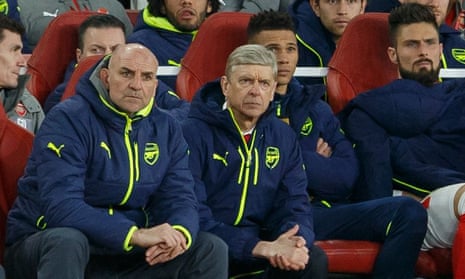The football club Arsène Wenger might have managed – and still might – did him a favour this week. Just 24 hours after his Arsenal team stumbled out of the Champions League, defeated 10-2 on aggregate by Bayern Munich, Paris Saint-Germain stole the headlines by crumbling in the face of a Barcelona assault that amounted to one of the greatest sporting comebacks of modern times.
By comparison with that feat of willpower and dark arts, the story of Arsenal’s surrender faded into relative insignificance and Wenger’s bitter criticisms of the referee will now be of interest only to the authorities. But they should refrain from punishing him. He is already being punished enough.
Arsenal’s result against Lincoln City in the FA Cup quarter-final this weekend on Saturday is irrelevant. Although losing to non-leaguers in a competition that Wenger’s teams have won six times in 20 years would certainly represent a further humiliation, it would not be the worst thing that ever happened. Such upsets are widely enjoyed but have few lasting consequences.
Bayern Munich, on the other hand, are the kind of opponents against whom Arsenal ought to be measuring themselves on equal terms. As, come to that, are Barcelona. Wenger whined on Wednesday that, after “looking a little bit at the Champions League history”, he had discovered that his team had met either Bayern or Barcelona in six of the past seven years. What he failed to mention was that Arsenal were also eliminated by Milan and Monaco during that period, so their failures are not just down to the superior forces of Bavaria and Catalunya.
You might have assumed he would know the relevant statistics without doing any research. But the point is that these are the sort of opponents Arsenal must expect to meet on equal terms in the final stages of the Champions League, at least if they want to consider themselves worthy of a place among the toppermost of the poppermost.
The past decade has seen Wenger change the terms on which success is judged to suit his club’s performance. “In the last nine years,” he continued this week, “we were only once the worst team performing in the Champions League from England.” That may indeed be true. But try imagining those words coming from the mouth of Alex Ferguson.
A personal view is that the Frenchman was lucky to survive the 8-2 drubbing at the hands of Ferguson’s team at Old Trafford in 2011. That day it became clear that Wenger, for all the honours he had brought to the club, was capable of supervising a performance which, for sheer spinelessness, surely had no equal in the history of English football’s top tier.
Again, Wenger’s Arsenal and Ferguson’s United were supposed to be competing as equals, more or less. Once in a while you have a bad day and lose 4-0 to a close rival. That happens. But 8-2? Fire up that imagination again and picture a team sent out by Shankly or Clough, Ferguson or Mourinho, falling to such a scoreline.
When a Wenger team of the past 10 years collapses, it really does fall apart. Yes, there are injuries. But every team gets injuries. Yes, there are outbreaks of bad luck. But everyone gets those, too. When a team’s fortunes turn so drastically on the fate of a single player – Laurent Koscielny, injured during the first leg against Bayern and dismissed in the return – there must be something very flawed in the preparation.
It is now five years since, with Cesc Fàbregas and Samir Nasri on the brink of leaving the club for what they saw as bigger things, Wenger began to be quizzed about the absence of real leaders in his team, the kind of players who stiffen the collective spine in moments of crisis, and about a creeping mental softness. “You always hear that,” he responded, with a dismissiveness the accusation did not deserve, “but I think what would be very nice is to have 11 leaders. Football is not about one magical man who can make miracles.”
Sometimes even an expert must be challenged. When Don Revie enticed Bobby Collins to Leeds United and Brian Clough persuaded Dave Mackay to join Derby County, each manager was giving his squad a totemic figure radiating authority and the drive to win, always ready for the fight. Wenger inherited one of those figures in Tony Adams and acquired another in Patrick Vieira. His crucial failure – or refusal – to find their successors is exemplified by a contrast between the quality of N’Golo Kanté, whom he didn’t sign, and that of Granit Xhaka, whom he did.
You have to relate this to the exit of David Dein, the former vice-chairman, who recruited Wenger and worked closely alongside him before board-level disagreements led him to stand down and sell his shares in 2007. Dein had functioned as a sounding board for the manager and sometimes compensated for his blind spots, as allegedly happened over the purchase of Gilberto Silva, Arsenal’s last really effective screening midfield player, in 2002. Initially reluctant to sanction the acquisition, Wenger let the Brazilian go in 2008, at least a year too early.
Since Dein departed there has been no one of remotely comparable influence at board level. There has been no one at assistant manager level, either, to judge by the way Steve Bould sits mute and stone-faced at Wenger’s side in the dugout, apparently powerless to shape the current defence into something comparable to the back four in which he played.
Like Claudio Ranieri, whose dismissal in February would surely have come three months earlier had it been made solely on the basis of current results, Wenger owes his survival to former glories and to the careful husbandry that maintained a place in the top four during the upheaval of the move to the Emirates Stadium. Five years ago, having qualified for the Champions League for the 13th year in a row, he said: “You will see one day that it is not as easy as it looks.”
Of course it isn’t easy. But this week, in the face of fan protests, he was forced to restate his position. “I don’t work for my image,” he said. “I work for this club with full commitment. That’s what I do.” Indeed. He also works for a salary said to top £8m a year and a boss earning that sort of money must expect it to be used as a measuring tool. The events of Tuesday night proved that this proud and gifted man no longer measures up.

